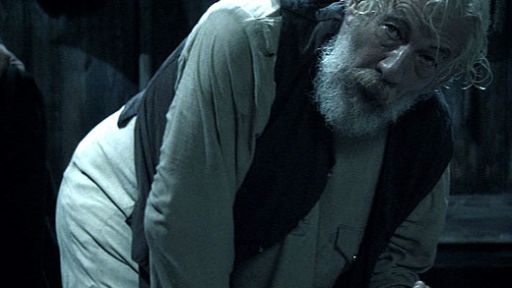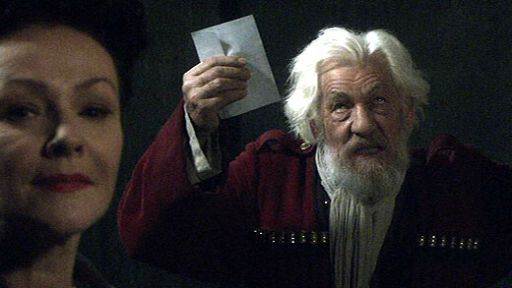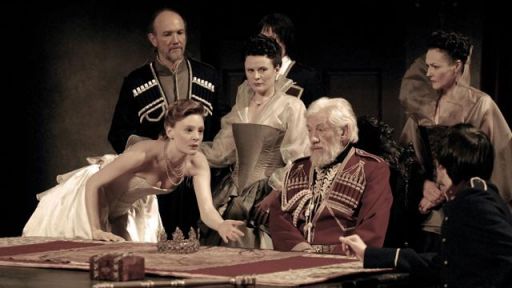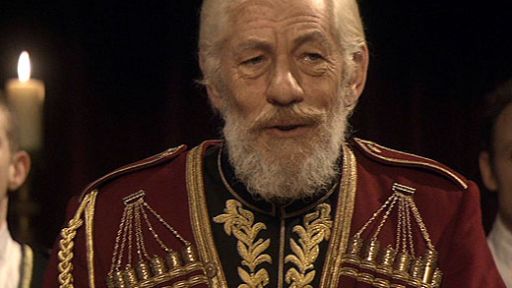Act IV has been relatively static. Except for the swordfight between Edgar and Oswald, the act is devoted to mental recovery, reconciliation, and preparation for the end. By comparison, Act V moves along at a swift and violent pace. The rivalry between Goneril and Regan for Edmund becomes explicit, Albany is informed of his wife’s treachery, a war is fought, and Cordelia loses, leading to a climax of deaths, deserved and undeserved. The play ends quietly enough, but only because but three people have survived the melee.
Act V. Scene 1
“To both of these sisters have I sworn my love, each jealous of the other as the stung are of the adder.” (Edmund)
Edmund, with Regan, sends a gentleman off to see if Albany is willing to fight or not. Regan then asks directly if he is sleeping with Goneril. He insists he is not, but she seems not to quite believe him, ordering him to “be not familiar with her.” Goneril now comes in with Albany. In an aside, Goneril declares that she would rather lose the battle than Edmund. Albany then distinguishes between his support for Lear and Cordelia but his determined opposition to a French invasion. Edmund promises to meet up with Albany at his tent, and leaves, with both women, each carping at the other. Alone, Albany is visited by Edgar from the shadows, who gives him the letter he took from Oswald. He says that if Albany wins, he should sound the trumpet, and Edgar will carry out his revenge, “wretched though I seem.” He exits quickly. Edmund returns, alerting Albany to the enemy’s proximity and true forces discovered by reconnaissance, and urges Albany to be ready. Alone, Edmund deliberates on his two women, which to have—both, one, or none—and the circumstances of jealousy he must deal with. He decides to await the outcome of the battle before determining a course.
pix 34
While Edmund can obviously be played in a variety of ways, Shakespeare allows for his relationship to the two daughters to be curiously asexual. His course in the play began with a desire to remove the stain of bastardy by replacing his brother in the eyes of his father, so to speak, but circumstances seem to have led him into a much broader play for power, perhaps even rule of the kingdom if he can remove Albany somehow. The daughters on this account are stones on which Edmund steps rather than objects of desire for themselves.
Act V. Scene 2
“Ripeness is all.” (Edgar)
In the play’s shortest scene, the battle takes place. Edgar first secludes Gloucester under a tree and leaves (for what we do not know). He returns to disclose that Cordelia has lost and that she and Lear are in custody. He takes Gloucester’s hand to lead him away, but Gloucester refuses: “a man may rot here.” Edgar becomes philosophical—“men must endure their going hence even as their coming hither”—and then utters one of the play’s most ambiguous lines: “ripeness is all.”
pix 35
“Ripeness is all” can mean in this context that we must be prepared for death, or that we have no control over when we die, or that we should not attempt to have any control over when we die, or that God decides when we will die, or that man must endure until death, however it happens. Edgar has just killed Oswald; he will soon kill Edmund. Goneril will poison her sister and then take her own life. Cordelia is hung and Lear dies of grief. How do these deaths combine into a single formula for fate?
Act V. Scene 3a
“Come, let’s away to prison; we two alone will sing like birds in the cage. . . So we’ll live and pray, and sing, and tell old tales, and laugh at gilded butterflies.” (Lear)
Edmund orders Lear and Cordelia guarded until a higher authority (Albany, Goneril, or Regan) can decide their fate. Cordelia is depressed, but Lear makes light of their state: “No, no, no, no. Come let’s away to prison. . . .” He is taken out defiantly. Secretly Edmund passes a paper to a captain with orders to kill Cordelia and Lear on the promise of fortune and the threat of unemployment. “If it be man’s work, I’ll do it.” Albany and the two daughters come in. Albany admires Edmund’s valor in battle, and asks for custody of Lear and Cordelia. Edmund says he has them under detention to avoid their appeal to the common people. As a delaying tactic, he asks for a day of recovery for the troops who suffer and bleed; the morrow will be a fitter time. Albany insists upon his superior station, but is interrupted by Regan, who equally insists that Edmund bore her commission in battle, hence deserved equal station. Goneril objects: “not so hot!” She attempts to appropriate him, and the two argue until Regan begins to feel ill. Regan attempts to turn her troops and prisoners over to Edmund, but Albany arrests him for treason, claiming he has already pledged himself to Goneril. Throwing down a gauntlet, he calls “let the trumpets sound.” Regan feels worse—“sick, O, sick”—and Goneril admits in an aside that she administered a poison to her sister. Edmund accepts the challenge. Regan must be supported out, and the trumpet sounds three times.
pix 36
Lear’s “let’s away to prison speech” holds a dear place in the hearts of most directors—it is almost never trimmed, and certainly never cut. It is a radically different Lear compared to the one ending Act IV. While pathetic in a way, it suggests that he and Cordelia can live a life of their own in prison, making it up perhaps, but one in which he can imagine fully renouncing his claims on kingship and power. It can be delivered as fully ironic (he really does not know what he is saying still), or silly, but it may be most powerful when given sincerely, without obvious irony.
Act V. Scene 3b
“The gods are just.” (Edgar) “The wheel is come full circle.” (Edmund)
Edgar enters, refuses to disclose his identity, but lays the charges at Edmund: “false to thy gods, thy brother and thy father . . . a most toad-spotted traitor.” Edmund hurls them back: “this sword of mine shall give them instant way.” They fight, and Edmund falls. Albany calls to save him, so he may have his own charge. The letter comes out. Goneril claims immunity as queen: “the laws are mine, not thine.” She leaves, followed by an officer on Albany’s orders. Edmund now admits all he has done, but asks for Edgar’s identity. Edgar forthwith provides it. “My name is Edgar and thy father’s son. The gods are just, and of our pleasant vices make instruments to plague us.” Albany elicits a history from Edgar, a speech which moves Edmund to do some good. But they are interrupted by the officer rushing on stage to announce the deaths of Regan and Goneril, the latter having poisoned the former and then taken her own life. Albany orders the bodies brought forth, but as they are being carried in he remembers Lear and Cordelia: “great thing of us forgot.” Edmund now confesses his order to hang Cordelia, and blames it on despair. He is carried off, leaving the stage free for the final scene of Lear and his three daughters arrayed there in death.
pix 37
Some productions omit bringing Goneril and Regan back on stage, leaving the end for Lear and Cordelia alone. This is a relatively long scene, depending of course on how long Edgar and Edmund fight, but during this scene Cordelia is hung. With the fight and the shocking announcement about Lear’s daughters, Lear and Cordelia are forgotten. It seems quite intentional. It emphasizes the senselessness of Cordelia’s death—although she was attempting an invasion—and the degree to which any death hangs on often irrelevant circumstances.
Act V. Scene 3c
“Why should a dog, a horse, a rat have life, and thou no breath at all?” (Lear)
Lear enters carrying Cordelia, howling. Albany, Edgar, and Kent alternate expressions of despair. Lear knows she is dead, but in desperation or madness still looks for signs of life. He melts a little—“her voice was ever soft, gentle and low, an excellent thing in woman”—then declares that he killed her killer, with some sense of bravura. But he as soon admits to age and troubles that ruin him. He spots Kent, now in his old habit, who connects his disguised self to his real self. Kent gives Lear the news of his other daughters, but Lear responds nonsensically. A messenger announces Edmund’s death. “That’s but a trifle” says Albany. He attempts to restore some order to the kingdom, with power restored to Lear and suitable honors to Kent and Edgar, but Lear pays no attention. “And my poor fool is hanged. . . O thou’lt come no more. Never, never, never, never, never.” He asks to have his shirt unbuttoned and comes close to Cordelia one last time, “do you see this? look on her: look, her lips, look there, look there.” He expires of grief. After more expressions of despair, Albany once more attempts repair, suggesting that Edgar and Kent “rule in this realm and the gored state sustain.” Kent declines: “I have a journey, sir, shortly to go; My master calls me, I must not say no.” Edgar concludes the play with this choral quatrain:
The weight of this sad time we must obey,
Speak what we feel, not what we ought to say.
The oldest hath borne most; we that are young
Shall never see so much, nor live so long.
pix 38





